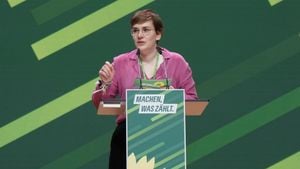The war in Ukraine remains at the forefront of international discourse as new developments emerge, reflecting both shifting public opinion and diplomatic efforts aimed at resolving the conflict. A recent survey indicated notable changes among the German population's willingness to support Ukraine, with only 28% backing continued military aid. This statistic reflects broader hesitations about the country's involvement as diplomatic talks continue to evolve.
The poll conducted by the research firm INSA for t-online showed 46% of respondents favored no support for Ukraine from the next German government, not through weapons or financial aid. Only 7% supported direct financial aid, and 8% advocated solely for military supplies. This decline demonstrates growing war fatigue and skepticism toward foreign intervention among German citizens.
Contrasting these sentiments, Russian UN Ambassador Vasily Nebenzya characterized recent UN resolutions as "not ideal" yet termed them, "a starting point for future efforts toward a peaceful resolution." The UN Security Council recently passed the US resolution focusing on the war, which attracted ten votes but faced five abstentions, pointing to the complex dynamics at play on the global stage, particularly as the resolution doesn’t explicitly address Ukraine's sovereignty or territorial integrity, raising eyebrows among European officials.
French President Emmanuel Macron weighed in on the conflict, asserting the possibility of achieving a ceasefire within weeks during his appearance on Fox News. Following talks with various European leaders, he noted preparedness among many to offer security guarantees to facilitate peace talks, indicating Europe's proactive approach toward ensuring stability.
Macron's comments coincided with another significant development—Russian President Vladimir Putin expressed support for proposals from US leader Donald Trump to decrease military spending among the US, Russia, and China. Putin commented, “I think it’s a good idea,” emphasizing the potential to significantly lower defense budgets if all parties agreed, showcasing the intersection of military economics and global diplomacy.
Adding to the diplomatic narratives, European Council President António Costa advocated for appointing a common special envoy for the Ukraine conflict during his statement at a press conference held alongside numerous European leaders and Canadian Prime Minister Justin Trudeau. He emphasized the importance of Europe unifying its stance and having representation for negotiations, which he believes could strengthen their position on the matter.
Meanwhile, substantial diplomatic discussions between the US and Russia continue, with another meeting scheduled following pivotal talks last week between Russian Foreign Minister Sergey Lavrov and US Secretary of State Marco Rubio. Scheduled to take place in Riyadh, this meeting aims to address the longstanding differences and seek to put the wheels of diplomacy back on track after nearly three years since the onset of the war. Notably, Ukrainian and EU representatives have not been invited to these talks, which underlines the complexity of the negotiations where these significant stakeholders remain sidelined.
Overall, the myriad developments this week not only encapsulate the fluid nature of the conflict but also reflect the varying perspectives of global leaders and citizens alike. Public support is wavering, which is evident from Germany's latest polling, signifying growing war fatigue among citizens. At the same time, diplomatic avenues appear to remain open, buoyed by high-level discussions involving key players like Trump and Macron, indicative of the potential for new pathways to peace, albeit complicated by unresolved territorial concerns and international dynamics.
With the situation shifting rapidly, it remains to be seen how public sentiment, international diplomacy, and military strategies will converge to shape the future of Ukraine and its position on the world stage amid this continuing conflict.



